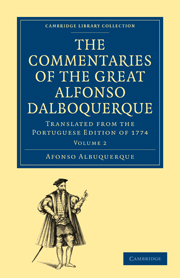 The Commentaries of the Great Afonso Dalboquerque, Second Viceroy of India
The Commentaries of the Great Afonso Dalboquerque, Second Viceroy of India Book contents
- Frontmatter
- Contents
- INTRODUCTION
- CHRONOLOGY OF PART II
- TITLE TO THE EDITION OF 1774–PART II
- TITLES OF THE CHAPTERS CONTAINED IN THE SECOND PART
- MAP OF INDIA
- PART II WHEREIN ARE CONTAINED THE DEALINGS OP THE GREAT AFONSO DALBOQUERQUE WITH THE VICEROY: AND WHAT HE DID AFTER BEING INVESTED WITH THE GOVERNMENT OF INDIA, UNTIL THE FIRST TAKING OF GOA
- CHAPTER I
- CHAPTER II
- CHAPTER III
- CHAPTER IV
- CHAPTER V
- CHAPTER VI
- CHAPTER VII
- CHAPTER VIII
- CHAPTER IX
- CHAPTER X
- CHAPTER XI
- CHAPTER XII
- CHAPTER XIII
- CHAPTER XIV
- CHAPTER XV
- CHAPTER XVI
- CHAPTER XVI
- CHAPTER XVIII
- CHAPTER XIX
- CHAPTER XX
- CHAPTER XXI
- CHAPTER XXII
- CHAPTEE XXIII
- CHAPTER XXIV
- CHAPTER XXV
- CHAPTER XXVI
- CHAPTER XXVII
- CHAPTER XXVII
- CHAPTER XXIX
- CHAPTER XXX
- CHAPTER XXXI
- CHAPTER XXXII
- CHAPTER XXXIII
- CHAPTER XXXIV
- CHAPTER XXXV
- CHAPTER XXXVI
- CHAPTER XXXVII
- CHAPTER XXXVIII
- CHAPTER XXXIX
- CHAPTER XL
- CHAPTER XLI
- CHAPTEE XLII
- CHAPTER XLIII
- CHAPTER XLIV
- CHAPTER XLV
- CHAPTER XLYI
- CHAPTER XLVII
- CHAPTER XLVIII
- CHAPTER XLIX
- CHAPTER L
- CHAPTER LI
- Plate section
CHAPTER XXVII
Published online by Cambridge University Press: 05 July 2011
- Frontmatter
- Contents
- INTRODUCTION
- CHRONOLOGY OF PART II
- TITLE TO THE EDITION OF 1774–PART II
- TITLES OF THE CHAPTERS CONTAINED IN THE SECOND PART
- MAP OF INDIA
- PART II WHEREIN ARE CONTAINED THE DEALINGS OP THE GREAT AFONSO DALBOQUERQUE WITH THE VICEROY: AND WHAT HE DID AFTER BEING INVESTED WITH THE GOVERNMENT OF INDIA, UNTIL THE FIRST TAKING OF GOA
- CHAPTER I
- CHAPTER II
- CHAPTER III
- CHAPTER IV
- CHAPTER V
- CHAPTER VI
- CHAPTER VII
- CHAPTER VIII
- CHAPTER IX
- CHAPTER X
- CHAPTER XI
- CHAPTER XII
- CHAPTER XIII
- CHAPTER XIV
- CHAPTER XV
- CHAPTER XVI
- CHAPTER XVI
- CHAPTER XVIII
- CHAPTER XIX
- CHAPTER XX
- CHAPTER XXI
- CHAPTER XXII
- CHAPTEE XXIII
- CHAPTER XXIV
- CHAPTER XXV
- CHAPTER XXVI
- CHAPTER XXVII
- CHAPTER XXVII
- CHAPTER XXIX
- CHAPTER XXX
- CHAPTER XXXI
- CHAPTER XXXII
- CHAPTER XXXIII
- CHAPTER XXXIV
- CHAPTER XXXV
- CHAPTER XXXVI
- CHAPTER XXXVII
- CHAPTER XXXVIII
- CHAPTER XXXIX
- CHAPTER XL
- CHAPTER XLI
- CHAPTEE XLII
- CHAPTER XLIII
- CHAPTER XLIV
- CHAPTER XLV
- CHAPTER XLYI
- CHAPTER XLVII
- CHAPTER XLVIII
- CHAPTER XLIX
- CHAPTER L
- CHAPTER LI
- Plate section
Summary
How the great Afonso Dalboquerque, immediately upon hearing this news, provided the strongholds of the island with men and captains, and ordered the trial of the Xabandar, on account of the evil report he had of him, and further doings.
No sooner was this interview concluded that the great Afonso Dalboquerque held with his captains concerning the approach of the Hidalcão, than he remounted upon his horse, with as many people as he could gather together, and made an inspection of all the passes of the island, in order to provide them with everything that was required. And in Benastarim he placed Garcia de Sousa with a hundred Portuguese soldiers, and six horse-soldiers, and four pieces of artillery and gunners to man them, and impressed strongly upon him the need of taking care to cause them to search everybody who passed over to the mainland, lest they carried with them any letters of advice from the Moors in Goa to those in the camp of the Hidalcão; and thence he proceeded to Old Goa, and therein he placed Jorge da Cunha with sixty cavalry soldiers, under orders to hasten to the defence of the other passes if need should arise; and at the pass of Augij he stationed Timoja's cousin and Mirale, with his own company; and at that of Gondalij he placed Francisco Pereira and Francisco de Sousa Mancias, with at housand native soldiers; and in the dry pass he left Jorge Fogaça, with twenty of our men and twenty native soldiers; and in that of Agacij D. Jeronymo de Lima, with forty Portuguese soldiers and a number of natives.
- Type
- Chapter
- Information
- The Commentaries of the Great Afonso Dalboquerque, Second Viceroy of IndiaTranslated from the Portuguese Edition of 1774, pp. 139 - 142Publisher: Cambridge University PressPrint publication year: 2010First published in: 1877


